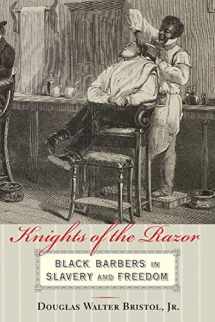
Knights of the Razor: Black Barbers in Slavery and Freedom
Book details
Summary
Description
Black barbers, reflected a freed slave who barbered in antebellum St. Louis, may have been the only men in their community who enjoyed, at all times, the privilege of free speech. The reason lay in their temporary―but absolute―power over a client. With a flick of the wrist, they could have slit the throats of the white men they shaved. In Knights of the Razor, Douglas Walter Bristol, Jr., explores this extraordinary relationship in the largely untold story of African American barbers, North and South, from the American Revolution to the First World War.
In addition to establishing the modern-day barbershop, these barbers used their skilled trade to navigate the many pitfalls that racism created for ambitious black men. Successful barbers assumed leadership roles in their localities, helping to form a black middle class despite pervasive racial segregation. They advocated economic independence from whites and founded insurance companies that became some of the largest black-owned corporations.


We would LOVE it if you could help us and other readers by reviewing the book
Book review



